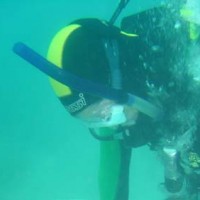Sam Burgess
PhD Graduate
Australian National University

From 2005 to 2022, the main node of the ARC Centre of Excellence for Coral Reef Studies was headquartered at James Cook University in Townsville, Queensland (Australia)








Sam grew up moving around four States and Territories in Australia before moving to South Australia to complete undergraduate studies in geology and environmental biology at the University of Adelaide. She moved to New Zealand to complete an MSc in marine ecology at the University of Auckland, examining the biogeography and reproductive ecology of deep-sea coral with Russ Babcock. Sam took a break from study for a year to work as a marine consultant for the South Australian Research and Development Institute (SARDI). Continuing on with the cold-water coral theme, she started a PhD in 2003 at the Research School of Earth Sciences, The Australian National University with Malcolm McCulloch, Mike Gagan and Tim Ward (from SARDI). The project was investigating the geochemical ecology of a high-latitude species of coral, commonly found in temperate waters around Australia. Sam enjoys spending her spare time outdoors, preferably by the ocean, doing something active such as diving, hiking or mountain biking. She is pursuing a post-doctoral fellowship at Oxford, building on her geochemical and ecological background in paleoenvironmental archives.
New DNA techniques are being used to understand how coral reacted to the end of the last ice age in order to better predict how they will cope with current changes to the climate. James Cook Univer
A new study on the effects of climate change in five tropical countries has found fisheries are in more trouble than agriculture, and poor people are in the most danger. Distinguished Profess
James Cook University researchers have found brightly coloured fish are becoming increasingly rare as coral declines, with the phenomenon likely to get worse in the future. Christopher Hemingson, a
Researchers working with stakeholders in the Great Barrier Reef region have come up with ideas on how groups responsible for looking after the reef can operate more effectively when the next bleaching
Abstract: As marine species adapt to climate change, their heat tolerance will likely be under strong selection. Individual variation in heat tolerance and its heritability underpin the potential fo
Abstract: The Reef Ecology Lab in KAUST’s Red Sea Research Center explores many aspects of movement ecology of marine organisms, ranging from adult migrations to intergenerational larval dispersal
Abstract: Macroalgal meadows are a prominent, yet often maligned component of the tropical seascape. Our work at Ningaloo reef in WA demonstrate that canopy forming macroalgae provide habitat for ad
Abstract: Sharks are generally perceived as strong and fearsome animals. With fossils dating back at least 420 million years, sharks are not only majestic top predators but they also outlived dinosa
Abstract: Connectivity plays a vital role in many ecosystems through its effects on fundamental ecological and evolutionary processes. Its consequences for populations and metapopulations have been
Abstract: Evolution of many eukaryotic organisms is affected by interactions with microbes. Microbial symbioses can ultimately reflect host’s diet, habitat range, and even body shape. However, how
Abstract: The past few years have seen unprecedented coral bleaching and mortality on the Great Barrier Reef (GBR) but the consequences of this on biodiversity are not yet known. This talk will expl